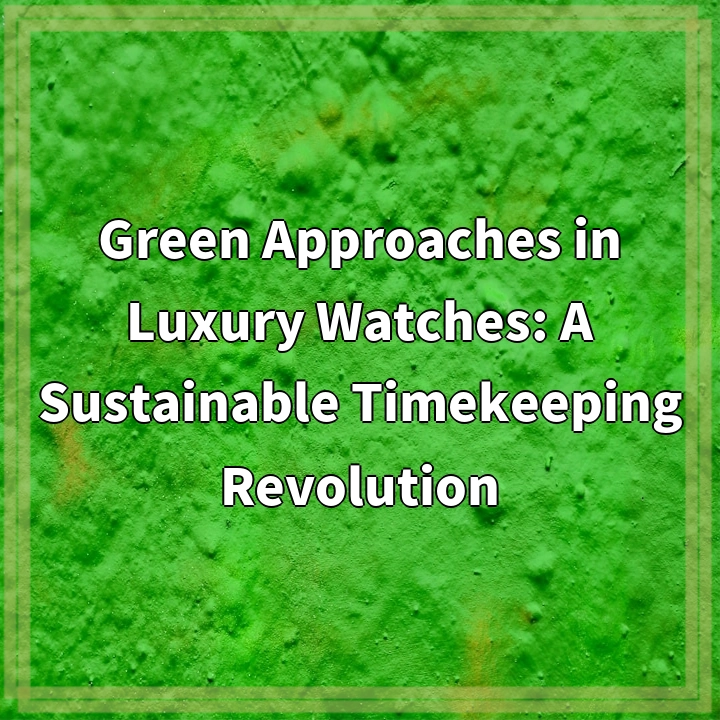
What it is:
Luxury watches have long been associated with opulence, craftsmanship, and exquisite design. However, with the growing concern for environmental sustainability, the luxury watch industry is undergoing a transformation towards greener approaches. This shift focuses on addressing the environmental impact of watch production, materials sourcing, and waste management, aiming to create a more sustainable timekeeping revolution.
Real-World Problems:
While luxury watches hold historical and emotional value for many, they also pose certain environmental challenges. These problems include:
1. Resource Extraction and Carbon Footprint:
The production of luxury watches often involves the extraction and processing of precious metals and minerals. Mining activities can have harmful ecological effects, including deforestation, habitat destruction, soil erosion, and water pollution. Additionally, the energy-intensive manufacturing processes contribute to the industry’s carbon footprint.
2. Limited Ethical Sourcing:
The luxury watch industry has faced criticism for questionable sourcing practices, particularly regarding the origin of precious metals and gemstones. Unethical mining practices, such as child labor and forced labor, are prevalent in certain regions. Ensuring ethical sourcing is crucial to promote fair trade and protect human rights.
3. Waste Generation and Disposal:
The disposal of watch batteries and electronic components contributes to electronic waste, which contains hazardous substances that can harm both human health and the environment. Proper recycling and waste management strategies are needed to minimize the impact of luxury watches on landfills and ecosystems.
4. Fast Fashion Mentality:
The luxury watch industry has, at times, encouraged a fast fashion mentality, with frequent product releases and marketing strategies that drive excessive consumerism and disposable culture. This contributes to overconsumption and unnecessary waste, undermining sustainability efforts.
5. Lack of Transparency:
Transparency regarding the environmental and social practices behind luxury watch production is often lacking. Consumers have limited information about the ecological footprint of specific brands and models, making it challenging to make informed decisions that align with their values.
By addressing these real-world problems, the luxury watch industry can pave the way for a sustainable timekeeping revolution. Through innovative materials, responsible sourcing, circular economy practices, and increased transparency, greener approaches can minimize the environmental impact of luxury watches while still embodying timeless elegance and craftsmanship.

Solutions:
To address the environmental challenges associated with luxury watches, the industry is adopting various strategies to promote sustainability:
1. Sustainable Material Sourcing:
Luxury watch brands are increasingly exploring alternative materials such as recycled metals, ethically sourced gemstones, and sustainable leather straps. By reducing reliance on newly mined materials, these practices aim to minimize the ecological impact of resource extraction and promote responsible sourcing.
2. Eco-Friendly Manufacturing Processes:
Brands are implementing energy-efficient manufacturing techniques and reducing greenhouse gas emissions throughout the production process. This includes the use of renewable energy sources, implementing recycling systems, and optimizing production to minimize waste.
3. Circular Economy Initiatives:
Luxury watch brands are embracing the concept of the circular economy by designing watches with longevity in mind. This involves creating durable timepieces that can be repaired, upgraded, or passed down through generations. Some companies also offer take-back programs to recycle and repurpose used watches.
4. Ethical Supply Chains:
To combat unethical practices, increasing transparency and promoting responsible supply chains is crucial. Brands are working towards ensuring fair trade, eliminating conflict minerals, and verifying the ethical practices of their suppliers to protect human rights and promote social justice.
5. Consumer Education and Awareness:
Raising awareness among consumers about the environmental impacts of luxury watches is essential. Brands are providing information about their sustainability initiatives and educating customers on the importance of conscious consumption. This empowers consumers to make informed choices and support sustainable luxury watch brands.
Through these solutions, the luxury watch industry is advancing towards a more sustainable future, where elegance, craftsmanship, and environmental responsibility can coexist. By embracing green approaches, luxury watches can become symbols of timeless beauty and ethical consciousness.















